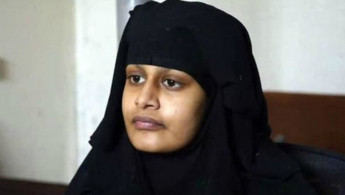Shamima Begum cannot return from Syria, UK Supreme Court rules
Britain's highest court on Friday rejected a bid by a woman who was stripped of her UK citizenship for joining the Islamic State group to return to challenge the decision.
Five judges at the Supreme Court gave a unanimous decision in the case of Shamima Begum, whose legal battles have come to be seen as a test of how Britain treat nationals who joined the jihadists.
They found her right to a fair hearing did not override considerations such as public safety, and that the decision to block her return should remain until she can participate "without the safety of the public being compromised".
"That is not a perfect solution, as it is not known how long it may be before that is possible," the head of the Supreme Court, judge Robert Reed, said in a written judgment.
"But there is no perfect solution to a dilemma of the present kind."
Now 21, Begum left her home in east London at the age of 15 to travel to Syria with two school friends and married an IS fighter.
|
||
Britain's then-interior minister Sajid Javid revoked her citizenship in 2019 on national security grounds amid an outcry led by right-wing newspapers.
'Extreme actions'
The Conservative lawmaker welcomed Friday's ruling, noting it underlined that the government must be able to decide if someone poses too serious a threat to enter the country.
"Any restrictions of rights and freedoms faced by this individual are a direct consequence of the extreme actions that she and others have taken," Javid added.
In 2019 Begum told The Times newspaper that she did not regret travelling to Syria and had not been "fazed" by seeing a severed head dumped in a bin.
Although Britain has blocked her return, the United States and several European countries have accepted the repatriation of their citizens accused of joining the IS group overseas, with some facing charges in their home countries.
Begum claims she married a Dutch convert soon after arriving in IS-held territory. She was discovered, nine months pregnant, in a Syrian refugee camp in February 2019.
She remains in a camp in poor conditions, while her husband is reportedly in jail in Syria.
Her newborn baby died soon after she gave birth, while her two other children also died in infancy under IS rule.
Begum has repeatedly appealed various court rulings over her ability to re-enter Britain to challenge the legality of losing her citizenship.
'Dangerous precedent'
Begum argued that the decision was unlawful as it has made her stateless and exposed her to the risk of death or inhuman and degrading treatment.
Begum is of Bangladeshi heritage but the country's foreign minister has said he will not consider granting her citizenship.
The Court of Appeal ruled in July last year that Begum needed to come back to mount a fair and effective appeal.
But the interior ministry in turn appealed against this decision, insisting she remained "aligned" with the proscribed terrorist organisation.
A government lawyer told the Supreme Court in November her return would create "an increased risk of terrorism".
Her legal team argued that this did not override the need for a fair hearing.
In upholding the government appeal, the Supreme Court found four main flaws with the Court of Appeal decision, including that it had erroneously made "its own assessment of the requirements of national security".
Rights groups, which have argued Begum should answer for any crimes in her home country, reacted with dismay to the ruling.
"Stripping someone's citizenship without due process sets a dangerous precedent," rights organisation Liberty said.
Follow us on Facebook, Twitter and Instagram to stay connected





 Follow the Middle East's top stories in English at The New Arab on Google News
Follow the Middle East's top stories in English at The New Arab on Google News


